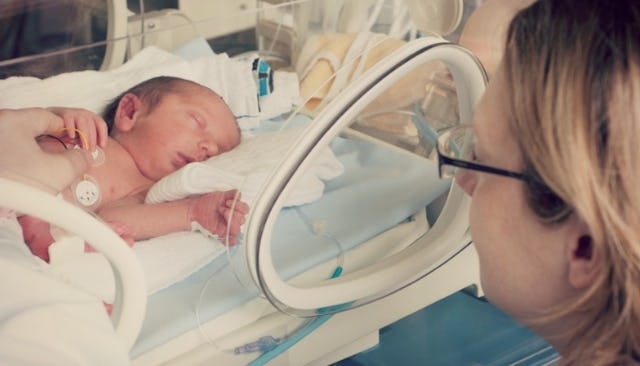6 Thoughts I Had When My Unborn Baby Was Diagnosed With A Serious Condition

“There could be something seriously wrong with your baby.” I will never forget those words the midwife said to me on a Friday afternoon phone call after my 12-week prenatal screening. My baby had an increased nuchal translucency (NT), which could mean lots of things. The midwife gave us an appointment for the following Wednesday for genetic counseling. “Bye. Have a good weekend.”
What just happened? I was in shock. I did not know what to do. What could I do? Apparently just sit there for five days creating worst-case scenarios in my head. I had no real information and a thousand what-ifs. This was going to be a long wait.
When Wednesday finally came, my husband and I went to the hospital for our genetic counseling appointment. We were informed of many possibilities that could be occurring. The list was exhausting to hear—”syndrome this” and “defect that.” With this new information in hand, we decided to get a chorionic villus sampling (CVS) test done that day.
As I lay there to be prepped for the invasive diagnostic test, the ultrasound tech conducted a scan to get a look at the baby. She seemed confused and called in the doctor. The NT size was now normal. Maybe they had been wrong last week! Maybe it’s a miracle! Maybe my baby is OK after all! With the doctor’s input, we decided not to go through with the procedure that day, as the possible risks could now outweigh the benefits.
Weeks and months passed, and we tried to classify the NT incident as a fluke. At the midpoint of my pregnancy, it came time to have my anatomy scan. We were so excited to find out if we were having a girl or boy. “It’s a little girl!” exclaimed the ultrasound tech. We could not have been happier.
Then it happened. With the look that crossed the tech’s face, I knew something was wrong. She lingered a little too long in one spot on my belly. “I can’t seem to get a good picture. I’ll let the doctor try,” she said and hurried out of the room. While my husband seemed calm and innocently unaware, I just knew.
The doctor informed us that day that our baby girl had a serious structural defect in her heart. Although the details of her congenital disease were not yet clear, we knew it was not good. We also knew it could require open heart surgery shortly after birth. We now had the information, but the what-ifs were still there.
Over the remainder of my pregnancy, we met with pediatric cardiologists and perinatologists and had numerous tests done to monitor our baby’s health. During this time, I went through emotional ups and downs. I would vacillate between being completely devastated to calmly accepting what was happening. In no particular order, the most recurring thoughts I had were as follows:
1. This can’t be happening.
Perhaps the doctors are all wrong, and my baby is OK. Not every case is textbook. My baby could be the one who surprises all the doctors. Maybe if I don’t say it out loud, it won’t be true. Yes, she will be just fine.
2. Did I do something to cause this?
Am I already a bad mother to this little girl? I felt like I was at fault. Could I have done something differently to have prevented this? I didn’t want people to know about the diagnosis for fear they would blame me too. For this reason, and No. 1 too, we only talked about the situation with our closest family and friends; it’s a decision that, looking back, I regret. It would have been helpful to have increased our support system during that time, and I now know I had no reason to feel ashamed.
3. What can I do to fix this or make the situation better?
I prayed. I meditated and visualized positive outcomes. I made appointments to tour NICUs and pediatric cardiac units at different hospitals. I joined online support groups for parents of children with heart problems. But mostly, I waited.
4. It’s not fair.
As cliché as it sounds, I did think, Why me? We are good people. Why was this happening? I felt cheated out of what my pregnancy was “supposed” to be like. I was supposed to be glowing and nesting, not becoming a medical expert.
5. What if she’s not OK?
This thought was too much to bear, so I did not allow my mind to go here very often.
6. Everything will be all right.
During this roller coaster ride of emotions, I would have days when I would feel completely at peace with our daughter’s congenital disease diagnosis. It was going to be OK. We could do this. I truly believed all of this.
On Christmas Eve that year, our baby girl was born. She was immediately transferred to our hospital’s NICU and from there to a cardiac intensive care unit at a children’s hospital in another state. We had a rough start, and by the time we brought her home at 9 weeks old, she had already completed her first of several open heart surgeries.
Our strong baby girl is 5-years-old now. She is doing very well, although our journey is not over. I still have my ups and downs. It is not easy, but most days I default to thought No. 6. Everything will be all right. It is going to be OK. We can do this. And I now know this is true.
This article was originally published on